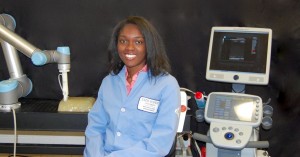Muyinatu Bell Receives Pathway to Independence Award
Bell received a Bachelor of Science degree from Massachusetts Institute of Technology in 2006 and a PhD in Biomedical Engineering from Duke University in 2012. She also was an academic visitor at the Institute of Cancer Research and Royal Marsden Hospital, focusing on using ultrasound imaging to help cancer patients undergoing radiation therapy by monitoring the natural movement of organs as the patient breathes.
Among her numerous awards are the Ford Foundation Postdoctoral Fellowship, UNCF/Merck Graduate Dissertation and Postdoctoral Fellowships, the Whitaker International Fellowship, Duke Endowment Fellowship.
Bell’s research interests include ultrasonic imaging, photoacoustic imaging, coherence-based beamforming, image formation, image quality, light delivery systems, medical robotics, and image-guided interventions. Bell’s co-authored paper, System Integration and Preliminary In-Vivo Experiments of a Robot for Ultrasound Guidance and Monitoring during Radiotherapy, was the runner-up for the Best Paper Award at the IEEE 17th International Conference on Advanced Robotics in Istanbul, Turkey. The paper received honorable mention.
Bell enjoys mentoring and recently one of her students, Alicia Dagle, received the Best Presentation Award at the 2015 NSF Computational Sensing and Medical Robotics Research Experience for Undergraduates (CSMR REU) award ceremony at Johns Hopkins.
To learn more about Dr. Muyinatu Bell, visit http://pages.jh.edu/~mbell36.



